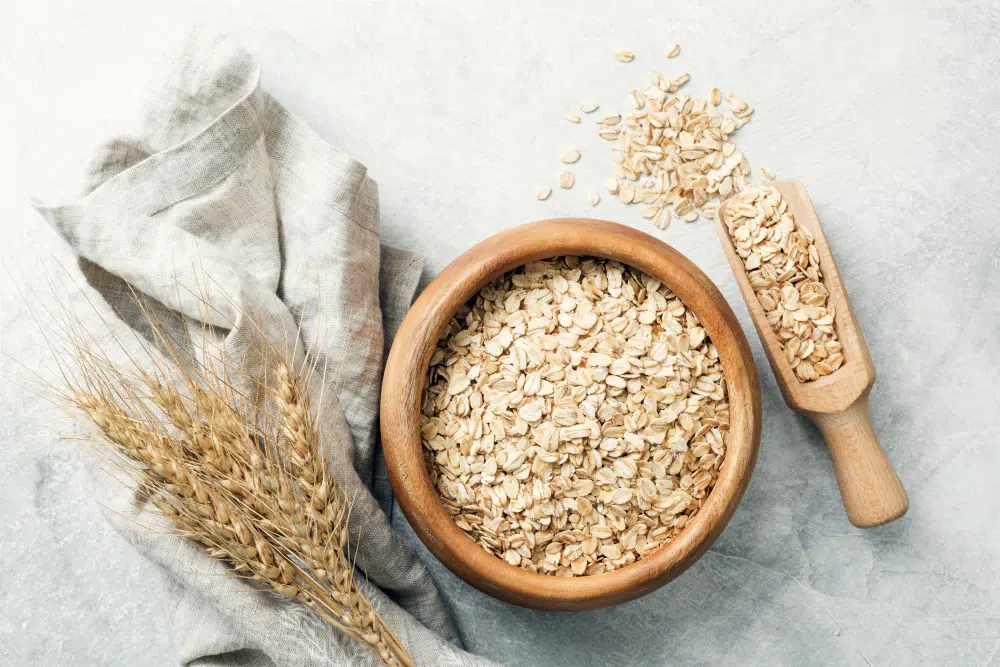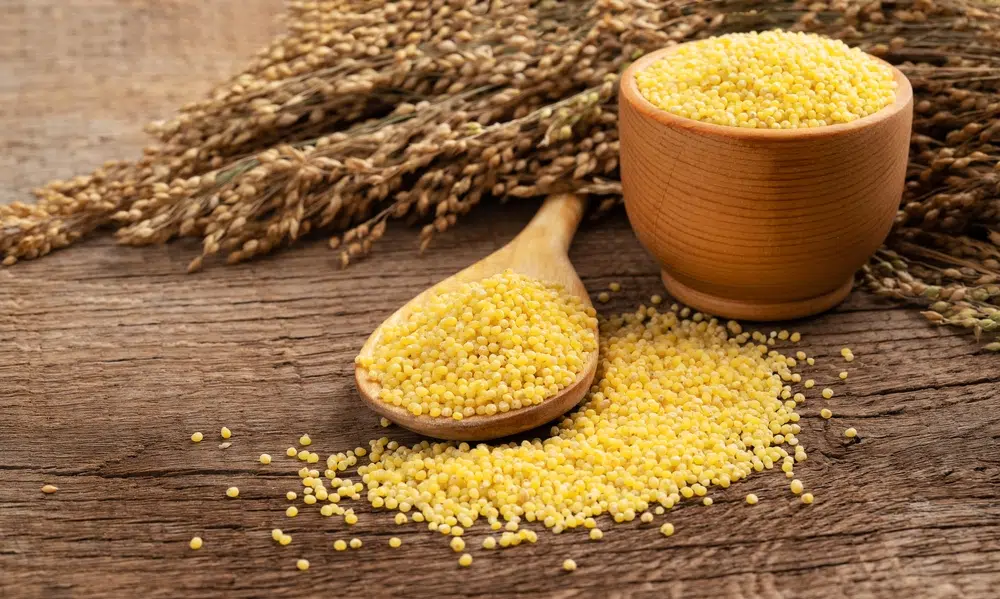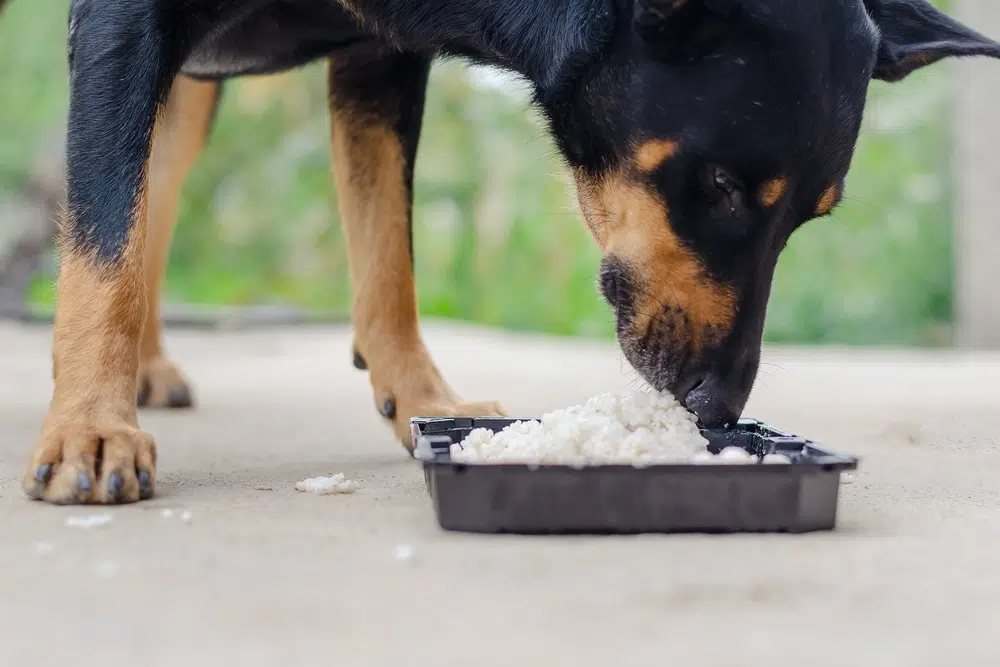When it comes to dog nutrition, carbohydrates can be a tricky topic. Although dogs primarily obtain energy from proteins and fats, many commercial dog foods include one or more carbohydrate sources. On the other hand, some formulas are grain-free and low in carbohydrates. So, what exactly are carbohydrates—and are they good for your dog?
Fortunately, carbohydrates can serve as a healthy energy source for dogs while also providing additional nutritional benefits, depending on the source. From whole grains to fruits, there are many safe carbohydrate options available.

6 Safe & Nutritious Carbohydrate Sources for Dogs
1. Whole Oats

- Nutritional Information (1/2 cup):
- Calories: 140
- Fiber: 4g
- Protein: 5g
- Fat: 2.5g
- Carbohydrates: 28g
- Sugar: 1g
- Recommended Serving: Approximately 1 tablespoon per 20 pounds of body weight. Do not exceed 4 tablespoons.
- Note: Whole oats are calorie-dense, so frequent consumption may lead to weight gain. Whether using traditional oats or rolled oats, these grains are rich in natural carbohydrates and fiber, making them one of the healthiest options—especially in homemade dog food recipes and treats.
2. Rice

- Nutritional Information (Brown Rice, 1/2 cup):
- Calories: 108
- Fiber: 2g
- Protein: 3g
- Fat: 1g
- Carbohydrates: 22g
- Sugar: 0g
- Recommended Serving: Should not exceed 10% of your dog’s total diet, particularly for small breeds or dogs with diabetes or digestive issues.
- Note: While white rice is often suggested for bland diets, brown rice is more nutritious but may be harder to digest for dogs with gastrointestinal problems. Always consult your veterinarian before adding rice to a carbohydrate-rich diet. Also, avoid feeding any rice cooked with oil, butter, or spices, as these additives can be toxic.
3. Barley

- Nutritional Information (Cooked Pearl Barley, 1/2 cup):
- Calories: 99
- Fiber: 3.1g
- Protein: 1.82g
- Fat: 0.3g
- Carbohydrates: 22.75g
- Sugar: 0g
- Recommended Serving: Limit barley to no more than 10% of your dog’s weekly food intake.
- Note: Barley is a whole grain that supplies essential nutrients like potassium, iron, and vitamin B6. Despite containing gluten, most dogs tolerate it well. If your dog has gastrointestinal issues or a grain intolerance, consult your veterinarian before adding barley to their diet.
4. Sweet Potatoes

- Nutritional Information (Sweet Potato Cubes, 1 cup):
- Calories: 114
- Fiber: 4g
- Protein: 2.1g
- Fat: 0.1g
- Carbohydrates: 27g
- Sugar: 6g
- Recommended Serving: Use as a snack or occasional treat—do not exceed 15% of your dog’s weekly food intake.
- Note: Sweet potatoes are a nutritious, starchy carbohydrate source found in many commercial dog foods. They provide vitamins A, C, B6, potassium, and calcium, supporting your dog’s nervous system, vision, skin, muscles, and bones. They also contain beta-carotene, an antioxidant that helps boost the immune system. However, overfeeding sweet potatoes may lead to vitamin A toxicity, so always consult your veterinarian—especially if your dog is prone to heart disease, allergies, or diabetes.
5. Bananas

- Nutritional Information (1 Medium Banana):
- Calories: 110
- Fiber: 3g
- Protein: 1g
- Fat: 0g
- Carbohydrates: 28g
- Sugar: 15g
- Recommended Serving:
- Small Dogs: One to two half-sized bananas per day.
- Medium Dogs: Up to 1/4 of a medium banana per day.
- Large Dogs: Up to 1/2 of a medium banana per day.
- Note: Bananas are rich in carbohydrates and potassium, making them a favorite treat for many dogs. However, due to their high sugar content and glycemic index, they should be served as an occasional treat rather than a staple. Dogs with diabetes or thyroid issues should avoid bananas. Always check with your veterinarian before introducing bananas into your dog’s diet.
6. Millet

- Nutritional Information (Cooked Millet, 1/2 cup):
- Calories: 103
- Fiber: 1.1g
- Protein: 3g
- Fat: 0.85g
- Carbohydrates: 20g
- Recommended Serving: Approximately 1 tablespoon per 20 pounds of body weight. Do not exceed 4 tablespoons.
- Note: Millet is calorie-dense, and frequent consumption may lead to weight gain. Despite being less popular in homemade dog food recipes compared to other grains, millet is an excellent source of healthy carbohydrates and dietary fiber. Its lower glycemic index and gluten-free nature make it a great alternative for dogs that cannot tolerate potatoes or rice.

Why Are Carbohydrates Important for Dogs?
While carbohydrates aren’t as critical as proteins and fats in a dog’s diet, they provide a valuable energy source and supply additional nutrients such as fiber and vitamins. However, balancing carbohydrate intake is essential, as some sources may cause blood sugar spikes. Active and working dogs may require extra carbohydrates for sustained energy, whereas less active dogs might benefit from a low-carb, lean diet.
How Much Carbohydrate Does Your Dog Need?
The appropriate amount of carbohydrates in a dog’s diet depends on various factors, including overall diet composition and individual health conditions. Typically, carbohydrates can account for anywhere from 20% to nearly 60% of a dog’s diet. However, without knowing your dog’s current diet, it’s nearly impossible to pinpoint the exact requirement. Always consult with your veterinarian, especially if your dog is sensitive to certain foods or has health issues.
Grains, Fruits, and Vegetables as Carbohydrate Sources
Carbohydrates can be derived from a wide array of foods, including whole grains, fruits, and vegetables. They come in two forms:
- Complex Carbohydrates: Found in whole grains like oats and millet, these carbohydrates break down slowly and provide sustained energy.
- Simple Carbohydrates: Found in fruits like bananas and sugary foods, these carbohydrates break down quickly and can lead to rapid blood sugar spikes if not moderated.
Both types have their place in a balanced diet, but simple carbohydrates should be limited—particularly in dogs prone to diabetes or thyroid issues.

Conclusion
Carbohydrates can be a healthy way to supplement your dog’s energy and provide essential nutrients, especially dietary fiber. Although carbohydrates have garnered mixed reputations, many dogs enjoy them, and they can be a beneficial addition to a balanced diet—whether you’re supplementing an existing meal plan or creating homemade dog food.



Pingback: Dog's Best Protein Sources: 6 Premium Nutritional Choices - Happy Paws Spot